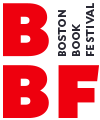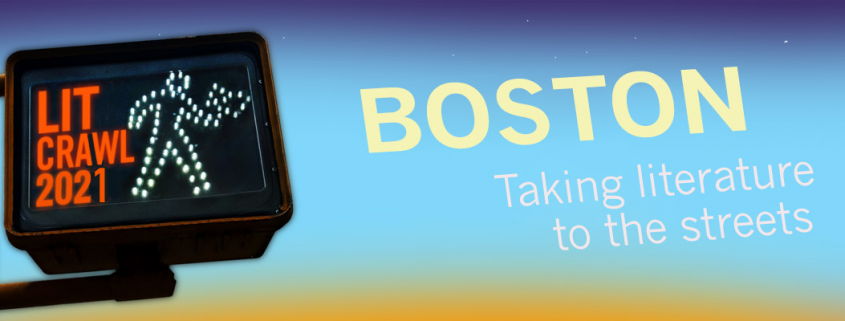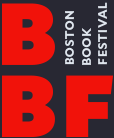Bibliomemoir: Putting Books in Conversation with Author Kim Adrian
This year, the Boston Book Festival’s annual Lit Crawl will mark an exciting return to in-person events for the Boston literary community. We had the opportunity to sit down with author Kim Adrian. Kim will be hosting her session, “The Art of (Writing About) Reading,” as a way to introduce audiences to the art of the bibliomemoir. Register here for this session on June 10 at Lit Crawl 2021!
BBF: What can audiences unfamiliar with bibliomemoir look forward to from your session at Lit Crawl?
Kim: The audience will hear from four practitioners of the genre—four writers with four different approaches to combining literary analysis with memoir. One of the readers, Adam Colman (New Uses for Failure) has described bibliomemoir as “a genre that eats other genres.” This is usually the thing that people get most excited about when they learn about this type of writing. For example, Kim McLarin’s bibliomemoir about James Baldwin’s novel Another Country combines a critical examination of the work with personal reflections on how Baldwin (and many other Black American writers) helped turn her into the woman and the writer she is today. At the same time, there’s a hefty strand of cultural criticism running throughout the whole thing, so the text feels very densely woven: personal, political-cultural, and literary all at once. Bibliomemoir encourages multifaceted or multivalent writing like this because you’ve always got at least two things going on: the writer writing reflectively on a personal experience (reading a book), and, at the same time, the writer examining why that book is (or perhaps is not) successful. For those comfortable working in this way it’s very tempting to add a third and perhaps even a fourth element into the mix.
BBF: How does “removing the glaze of pretension” influence the process of interpreting works of literature, either in general or in your specific experience?
Kim: With the phrase “removing the glaze of pretension” I mean getting out of the kind of faux-objective critical mode of passing judgement, speaking from on high, from a position of authority, which is the attitude most people associate with literary criticism, art criticism, criticism in general. That attitude implies that a work of art exists as an objective thing in the world, and that, as an objective thing, it requires a special kind of sensibility, a specially trained intellect, to be correctly perceived and interpreted. But a work of art does not exist in a vacuum. It is not a stable, immutable entity. In fact, there are as many ways to experience, for example, a great novel as there are readers of that novel, which is another way of saying that the novel itself changes for each reader. This is the premise on which bibliomemoir is based. The genre embraces the messiness of literature, the dynamism involved in the act of reading. That said, a good bibliomemoir will always take the act of criticism very seriously. But by its very nature bibliomemoir rejects the idea of critic-as-authortative-taste-maker, or critic-as-judge, and embraces, instead, criticism as a kind of creative, generative activity.
BBF: How do you think Boston, as a community or location, can contribute to the tradition of bibliomemoir? What aspects of the city do you think enrich literary criticism?
Kim: Bibliomemoir seems to be a growing genre right now. Much like microhistory, bibliomemoir upends a specific, traditional cultural structure—in this case the kind of authoritative perspective (rooted in entrenched power structures) that conventional criticism upholds. In this sense, it is an inherently political genre—a liberal or democratic genre. Boston is a left-leaning city that just so happens to be packed with great readers. If bibliomemor, as a genre, has a shot at finding a solid foothold with a hungry audience, Boston readers could well be the ones to make that happen.
BBF: How has the past year influenced your work, if at all?
Kim: It’s been a freaky year for me, of course. I’m no exception to that rule. COVID affected the launch of my bibliomemoir, Dear Knausgaard, pushing off the launch date by several months and putting events online. But it also nudged me into a new direction in my writing. For one thing, it got me thinking about magical thinking, simply because there was so much of that going on, especially at the beginning of the pandemic. Thinking about magical thinking got me thinking about imagination in general, so that I now find myself doing a lot of research on that topic. Beyond that, the further growth of the Black Lives Matter movement has affected everything—the whole way I see history, power, beauty, truth, language, perspective, my country, and my own existence within my own white skin, in ways I’m still trying to process and will continue to process, I’m sure, for years to come. Ditto the recent and ongoing challenges to our democracy (which have circled me back around to the concept of magical thinking and imagination). Long story short, I’m still very much trying to process the past year. My hope is to be able to write about some of the strangeness and change that we’ve been going through in my current project—which happens to be another bibliomemoir, this time about the life and work of the German Romantic writer E.T.A. Hoffmann.
We’re looking forward to hearing more from Kim and all of our other Lit Crawl presenters on June 10 in Cambridge! “The Art of (Writing About) Reading” will take place at 7:00 PM at Dial Restaurant in Cambridge. For more information about Lit Crawl and to register, see the BBF website.





